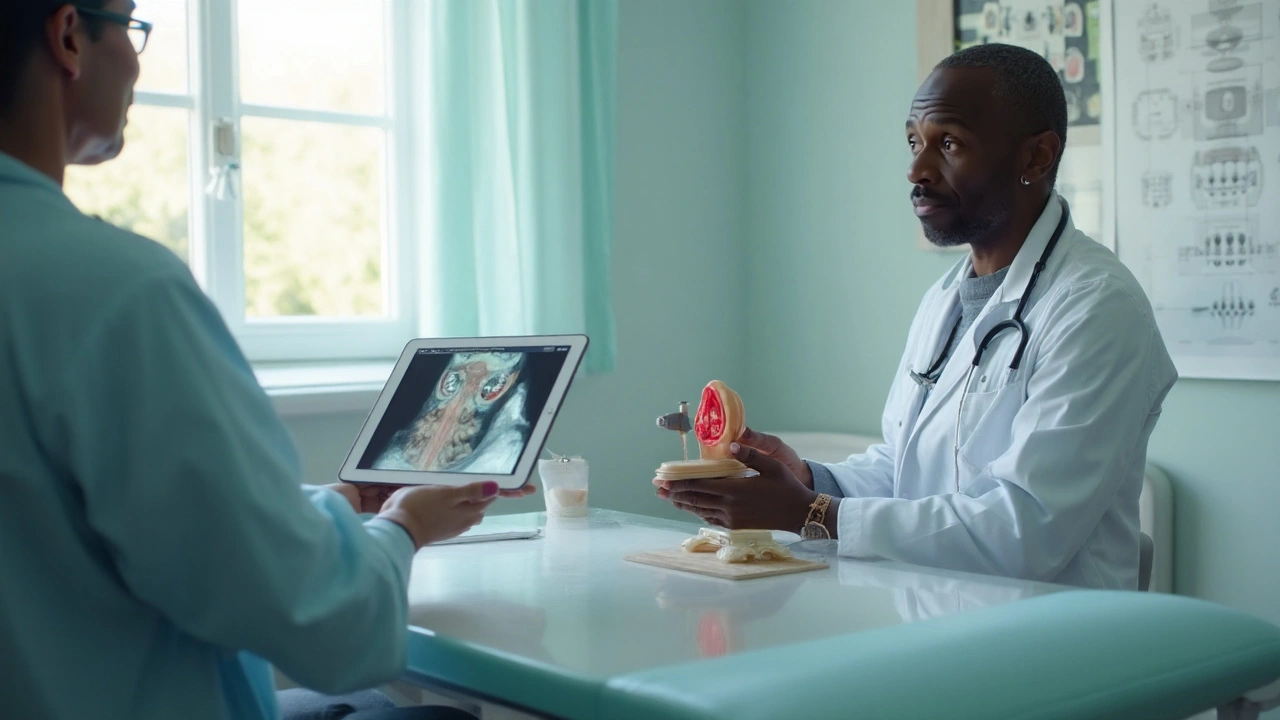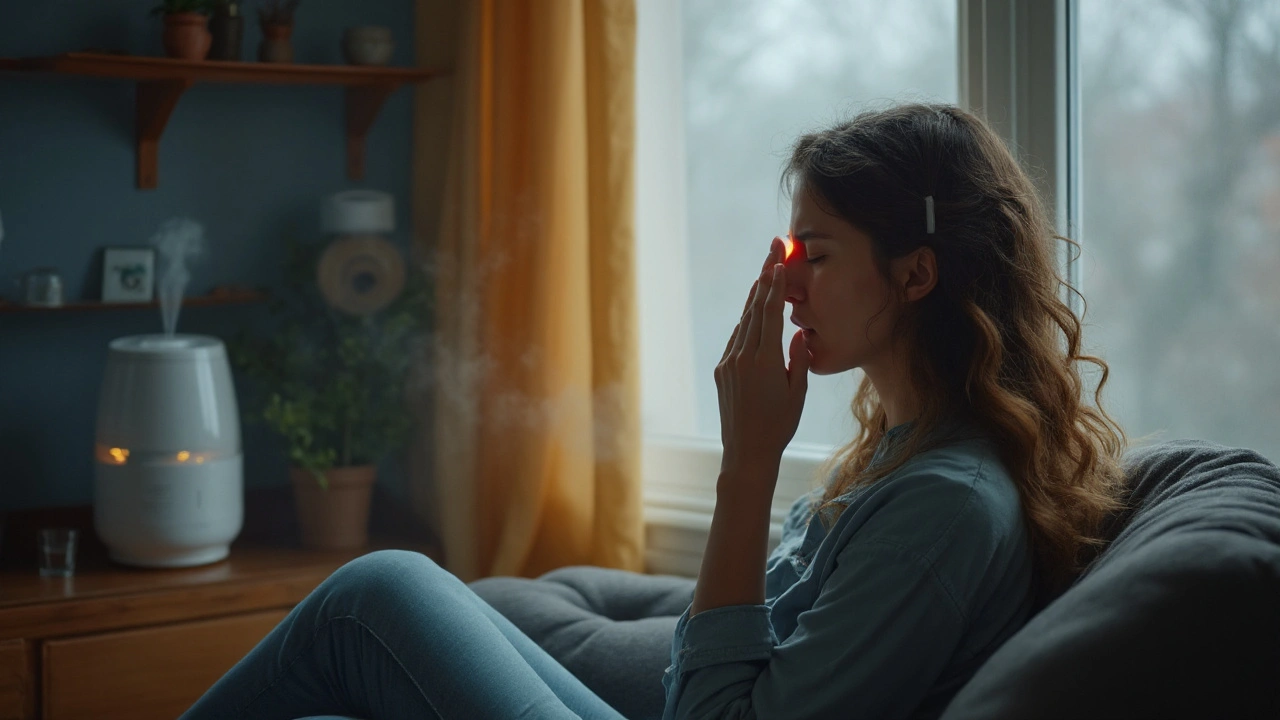You wake up with face pressure, a blocked nose, and that dull ache behind your eyes. By afternoon, your ear feels full, your hearing dips, and the room starts to tilt. Is this just a sinus infection, or is it poking the bear and setting off a Meniere’s flare? Here’s the short answer: sinus infections don’t cause Meniere’s, but they can nudge a sensitive inner ear and make vertigo more likely. The longer answer matters because it changes what you do today, this week, and next time a cold rolls through the house.
- Meniere's disease and sinus infections are separate problems, but shared pathways-pressure, inflammation, fluid shifts-can connect them during flares.
- Most sinus infections are viral and settle in 7-10 days; antibiotics help only in specific cases (severe, persistent, or “double‑worsening” symptoms).
- Practical rule: calm nose and middle‑ear pressure early (saline, nasal steroid), keep salt steady, hydrate, and protect sleep-these reduce vertigo risk.
- Red flags (high fever, severe facial pain, stiff neck, neurological symptoms, new hearing loss) need urgent medical care.
- Allergy control and daily nasal care lower the odds of sinus‑triggered ear trouble, especially in windy, pollen‑heavy seasons like spring in New Zealand.
“Meniere’s disease is a disorder of the inner ear that can lead to dizzy spells (vertigo) and hearing loss.” - National Institute on Deafness and Other Communication Disorders (NIDCD)
What actually links sinus infections and Meniere’s?
First, a quick map of the neighborhood. The sinuses are air pockets around your nose that can swell and clog during a cold or allergy surge. The middle ear connects to the back of the nose through the eustachian tube; it opens to equalize pressure when you swallow or yawn. Meniere’s lives deeper in the inner ear, where fluid balance and tiny hair cells control hearing and balance. Your sinus infection doesn’t “infect” the inner ear, but it can stir up conditions that annoy it.
Three believable links explain why sinus trouble can coincide with vertigo or ear fullness:
- Pressure cascade: Inflamed nasal passages can block the eustachian tube, causing negative pressure in the middle ear. That tug can increase the sense of fullness and tinnitus on the Meniere’s side and sometimes precede vertigo.
- Inflammatory spillover: Viral colds and bacterial sinus infections raise inflammatory cytokines in nearby tissue. In people prone to endolymphatic hydrops, that extra inflammatory noise may lower the threshold for an attack.
- Autonomic stress load: Poor sleep, dehydration, and pain push the body’s stress response. Many patients notice Meniere’s is more reactive when they’re run down-colds and sinus pressure do exactly that.
What the science says in 2025:
- Sinusitis and allergic rhinitis are common fellow travelers in ear clinics. ENT guidelines (AAO‑HNS for Meniere’s; EPOS for rhinosinusitis) acknowledge symptom cross‑talk but do not list sinusitis as a cause of Meniere’s.
- Observational studies report more ear fullness and tinnitus during upper‑respiratory infections in people with Meniere’s, but controlled data tying sinus infection treatment to fewer vertigo attacks are limited.
- Allergy control and nasal steroid use reduce sinus and nasal inflammation; many clinicians find they also tame ear pressure sensations in Meniere’s, even if the inner ear disorder itself remains.
Think of it this way: a sinus infection shakes the stage. If your inner ear is already on edge, shaky floors are more likely to set it off. The plan is to steady the stage fast.
| Topic | Useful data (2025) | Source (by name) |
|---|---|---|
| Meniere’s burden | About 600,000+ people in the U.S. live with Meniere’s; tens of thousands of new diagnoses yearly. | NIDCD |
| Sinusitis prevalence | Chronic rhinosinusitis affects roughly 1 in 10 adults; acute viral sinusitis is far more common, esp. in winter. | EPOS consensus; ENT/primary care guidance |
| Antibiotics for sinusitis | Reserved for severe onset, persistent symptoms ≥10 days without improvement, or “double‑worsening.” | Infectious Diseases Society of America (IDSA), primary care guidelines |
| Allergy impact | Allergic rhinitis increases nasal/eustachian tube inflammation, adding pressure swings that can aggravate ear symptoms. | Allergy/ENT guidelines |
Those numbers don’t prove cause and effect, but they frame the practical reality: sinus issues are common, Meniere’s is sensitive, and smart nasal care reduces chaos for both.

How to tell when a sinus infection is stirring up your ear: step‑by‑step
If you’re trying to work out whether your current spell is sinus‑driven, follow this simple flow. It helps you capture patterns and pick the right next step.
- Check the basics (today): Fever? Thick, colored nasal discharge? Facial pain that worsens when you lean forward? Toothache on the upper jaw? Those lean toward acute sinusitis. Sneezing and itchy eyes point more to allergy.
- Press and listen: Gently press along your cheekbones and between your eyes. Pain plus new nasal blockage suggests sinus inflammation. Now note your ear: is there a new sense of pressure or muffled hearing since the nose blocked up? That’s a clue the eustachian tube is in the mix.
- Vertigo profile: Sinus‑related dizziness feels more like unsteadiness or “head too heavy.” A classic Meniere’s attack is spinning vertigo, often with louder tinnitus, aural fullness, and a dip in hearing on one side.
- Timing matters: If ear fullness and tinnitus ramped up a day or two after the nasal congestion started, you likely have a sinus‑ear pressure cascade. If vertigo arrives without nasal symptoms, it’s less likely to be sinus‑driven.
- Hydration and salt check: Did you miss fluids, run on coffee, or eat a salty takeaway last night? Dehydration and abrupt salt spikes can magnify pressure sensations and dizziness.
- Track a 48‑hour trial: Start nasal care (saline + steroid, below) and gentle pressure equalization. If ear pressure and lightheadedness ease with the nose, the link is strong. If spinning vertigo worsens despite good nasal care, call your clinician.
Signs it’s probably a sinus‑triggered Meniere’s flare:
- New nasal blockage with facial pressure followed by same‑side ear fullness/tinnitus.
- Vertigo shows up in short bursts when you bend forward or lie flat during the sinus peak.
- Symptoms improve within 24-72 hours of consistent nasal care and sleep.
Red flags that need urgent care:
- High fever (≥39°C), severe facial pain on one side, swelling around an eye, very stiff neck, or confusion.
- Sudden, persistent new hearing loss or a dramatic change in hearing not improving within 24 hours.
- Neurological symptoms (double vision, slurred speech, weakness) with dizziness.
Example scenario from real life here in Wellington: northerly winds kick off a heavy pollen day; you spend a Saturday pruning. By evening, your nose is blocked and your ear on the Meniere’s side feels stuffed. You start saline rinses and an intranasal steroid before bed, switch to decaf, keep salt steady, and sleep early. Sunday is still fuzzy, but the ear fullness backs off by Monday morning. That pattern fits sinus‑driven pressure rather than a primary inner‑ear attack.
Quick decision guide
- If you have mild to moderate sinus symptoms without high fever or severe pain: start nasal care at home, hydrate, and rest 24-48 hours.
- If symptoms persist beyond 10 days, get much worse after initial improvement, or are severe at onset: book your GP or ENT to consider bacterial sinusitis and suitable antibiotics.
- If vertigo is violent, hearing drops suddenly, or you have neurological signs: seek urgent care now.

Prevention and treatment playbook (calm the nose, protect the ear)
Here’s a practical plan you can use during colds, allergy flares, or suspected sinus infections-tuned for someone with Meniere’s.
Day 0-3: Reduce nose and middle‑ear pressure
- Saline first, often: Rinse or spray 2-4 times daily. Choose isotonic saline for daily use; hypertonic can cut swelling fast but may sting.
- Intranasal steroid: One to two sprays per nostril once daily (budesonide, fluticasone). These reduce inflammation in a few days and are safe long‑term for most adults. Aim the spray outward, not toward the septum.
- Gentle pressure moves: Swallow, sip water, and do soft Valsalva only if it doesn’t provoke vertigo. Avoid forceful popping during an acute Meniere’s spike.
- Steam and humidity: Warm showers or a bowl of steam ease thick mucus. Keep indoor humidity around 40-50% to avoid mold growth.
- Fluids and steady salt: Drink water or warm tea; keep sodium consistent across the day. Big salt swings can worsen inner‑ear fluid dynamics.
- Sleep on schedule: Poor sleep is a top vertigo trigger. Early nights pay off more than any supplement.
Pain and congestion choices (what helps, what to skip)
- Paracetamol/acetaminophen: Good for facial pressure pain and safe for most people.
- NSAIDs (ibuprofen): Can help pain and inflammation if you tolerate them; take with food and check interactions.
- Oral decongestants (pseudoephedrine, phenylephrine): Can reduce nasal swelling but may raise blood pressure, cause jitters, and worsen sleep-common vertigo triggers. If you use them, keep doses low and short, and avoid close to bedtime.
- Topical decongestant sprays (oxymetazoline): Helpful for 2-3 days max to avoid rebound congestion.
- Antihistamines: Non‑sedating (cetirizine, loratadine) help allergy‑driven symptoms. Sedating ones can worsen imbalance; save for nighttime if needed.
When antibiotics make sense
- Consider antibiotics if symptoms are severe from the start (high fever, severe unilateral facial pain), persist beyond 10 days without improvement, or improve then worsen (“double‑worsening”). That’s the pattern infectious disease guidelines use.
- Tell your GP about your Meniere’s. Some antibiotics are ototoxic (certain aminoglycosides) and avoided unless essential. Common sinus antibiotics (like amoxicillin‑clavulanate) are not ototoxic, but your clinician will tailor to your history.
Vertigo control during sinus flares
- Keep your rescue plan handy: vestibular suppressants (e.g., short‑course prochlorperazine, meclizine) or anti‑nausea meds prescribed by your doctor. Use them short‑term; they can delay vestibular compensation if overused.
- Lie on your non‑affected side in a dark, quiet room. Keep your gaze fixed on a stable point and breathe slowly.
- If you use diuretics for Meniere’s, stay consistent. Do not add extra doses without medical advice; dehydration can worsen lightheadedness.
Allergy prevention (a big lever in New Zealand’s windy seasons)
- Check pollen calendars and windy forecasts in spring. On high‑pollen days, keep windows closed during peak hours and shower after outdoor time.
- HEPA filter in the bedroom and regular vacuuming (true HEPA) reduce indoor triggers.
- Talk to your GP about daily intranasal steroids during allergy season and non‑sedating antihistamines as needed.
- Immunotherapy (allergy shots/drops) is worth discussing for persistent, proven allergies; it lowers nasal/eustachian inflammation long term.
Travel and flying
- Don’t fly with an active sinus infection if you can avoid it. If you must, use saline and an intranasal steroid for several days before, and a short course of a topical decongestant spray 30 minutes before takeoff and landing.
- Chew gum, sip water, and yawn during ascent/descent. Consider filtered earplugs designed for pressure changes.
What to ask your doctor
- Could this be bacterial sinusitis or mostly viral/allergic? What’s our plan for each?
- Which decongestants or antihistamines are safest with my blood pressure and Meniere’s history?
- Do I need a hearing test after this flare? Should we adjust my Meniere’s maintenance plan?
- Would a short steroid taper help severe ear fullness, or do the risks outweigh the benefits for me?
Pro tips that make a difference
- Nasal routine pairs: Saline first, steroid second. Morning and evening. Set a phone reminder during cold season.
- Temperature matters: Warm saline irrigations are more comfortable and improve adherence.
- Meal rhythm > strict salt cuts: Keep meals evenly salted across the day rather than aiming for extremes.
- Write down patterns: Note weather, pollen, meals, sleep, and symptoms. After a month, triggers get obvious.
Mini‑FAQ
- Can a sinus infection cause vertigo? Yes, but most often as unsteadiness or brief spins from pressure changes and inflammation. In someone with Meniere’s, that destabilization can trigger a larger attack.
- Do nasal steroids help the ear? Indirectly. They lower nasal/eustachian swelling, which reduces middle‑ear pressure swings many people feel as fullness.
- Should I take antibiotics early to prevent a Meniere’s attack? No. Early antibiotics don’t prevent viral sinusitis from running its course and won’t lower vertigo risk. Use the severity/persistence rules or your doctor’s advice.
- Is it safe to do Epley maneuvers during a flare? Epley treats benign positional vertigo (BPPV). If your clinician has confirmed BPPV, Epley can help. For pure Meniere’s attacks, Epley won’t stop the episode and may worsen nausea.
- Could this be mastoiditis or another ear infection? Severe ear pain, fever, swelling behind the ear, or a pushed‑forward ear are urgent signs-get seen right away.
Quick checklist
- Start: saline + intranasal steroid, hydrate, steady salt, early night.
- Use pain relief you tolerate; keep oral decongestants short and daytime only if needed.
- Track 48 hours: better, same, or worse?
- Escalate care if severe at start, day 10+ without improvement, or sudden hearing changes.
Troubleshooting different scenarios
- I keep getting sinus infections every month. Ask about allergic rhinitis, deviated septum, or chronic rhinosinusitis. Long‑term nasal steroid, allergy testing, and possibly imaging may help. Consider immunotherapy if allergies are confirmed.
- Decongestants make me jittery and sleep worse. Skip oral decongestants. Use topical spray very short‑term or lean into saline + steroid + humidification. Protect sleep-sedating antihistamine only at night if your doctor agrees.
- I’m pregnant or breastfeeding. Many nasal steroids and saline are considered safe; avoid non‑essential oral meds and confirm choices with your midwife or GP.
- I have high blood pressure. Avoid or limit oral decongestants. Focus on topical therapies and non‑drug measures. Keep your BP meds on track; sleep and hydration help too.
- I’m not sure if this is BPPV or Meniere’s. BPPV is triggered by head position changes and lasts seconds. Meniere’s attacks last 20 minutes to several hours, often with ear fullness and tinnitus. A clinician can test and teach you the right maneuvers.
Why you can trust this plan
This article pulls from established guidance used in 2025 by ENT specialists and primary care: AAO‑HNS clinical guidance for Meniere’s, EPOS consensus on rhinosinusitis, NIDCD education, and IDSA rules for acute bacterial sinusitis. The common thread across those sources is simple: treat the nose early and appropriately, keep the ear calm and stable, and escalate care for specific red flags-not for every stuffy day.
If you live somewhere windy and changeable like Wellington, build your allergy and cold‑season routine now. It’s far easier to prevent a spiral than to claw back from one.

Wendy Chiridza
September 7, 2025 AT 04:46